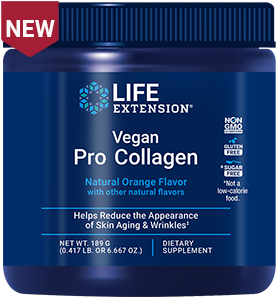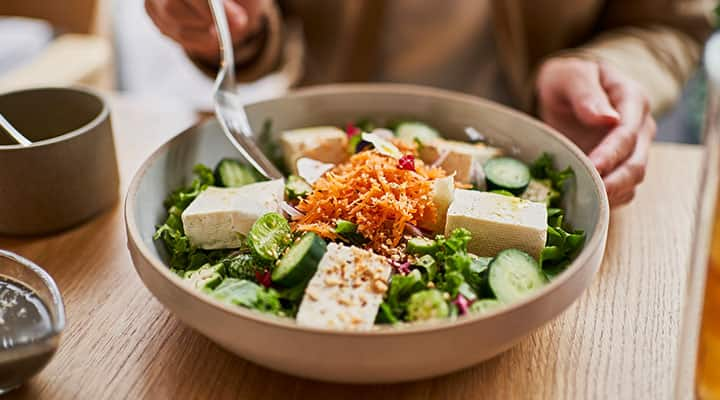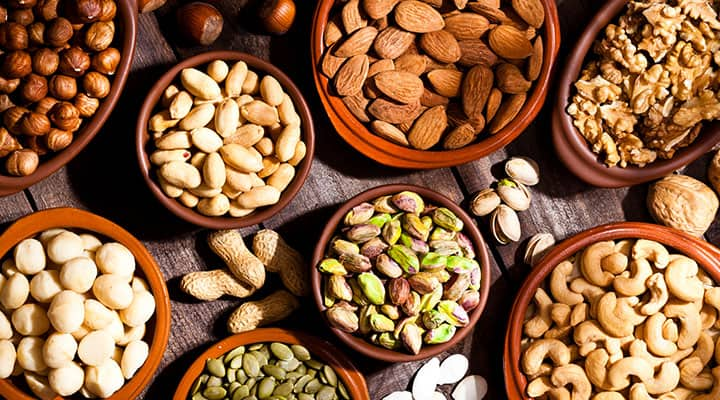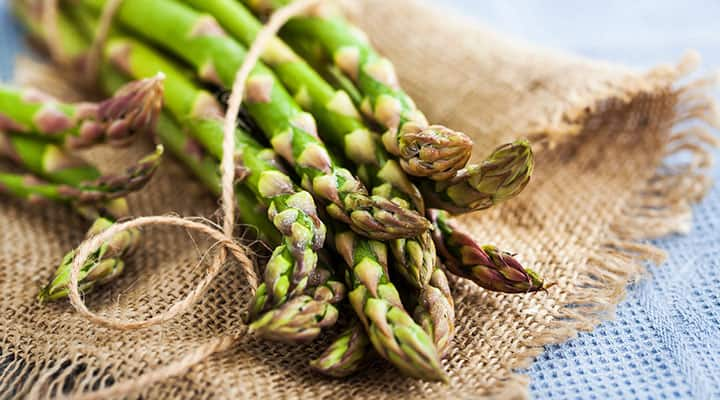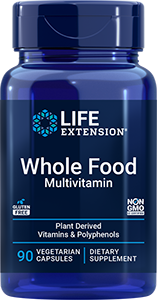
Are There Vegan Sources of Collagen?
Published: June 2024
Collagen is one of those buzzwords that feels like it's come from out of nowhere. One day, it was discreetly listed on the labels of skin creams, ointments, and lotions; the next, it was popping up everywhere—including on supplement bottles and drink mix packages as an ingestible version of the popular protein.
Do you know where you'll find the most collagen? Within your own body. Collagen is the primary building block for hair, skin, nails, bones, tendons, intestines, and connective tissue. It's essential for gorgeous skin and strong bones. However, the amount of collagen the body produces declines as we age. And that is why you're seeing it added to beauty and health products everywhere.
For those who eat meat, it's easy to meet collagen needs with a powder or capsule. But what to do for collagen support if you're vegan or want to eliminate or reduce animal products in your diet?
Good news: you don't need to consume actual collagen to stimulate collagen production. There are plenty of vegan-friendly options, including ingredients you can incorporate into your daily recipes.
Let's explore how you can boost your collagen levels, even if you follow a vegan lifestyle.
What are the best vegan collagen supplements?
While there are no plant-based sources of collagen, there are supplements that can help increase your body's normal collagen production using vegan options. Here are our top three suggestions.
1. Vitamins and minerals
Getting a proper intake of vitamins and minerals will help you maintain healthy collagen production (along with many other noteworthy benefits). While it's well-known for immune function support, vitamin C is one of the key pieces for collagen synthesis. It enhances the absorption of amino acids, supports healthy collagen formation, and helps protect skin cells from oxidative stress. While you're at it, add zinc, copper and manganese to your supplement shopping list. Your body also uses these minerals to make collagen without animal byproducts. Speak with your doctor or dermatologist to personalize your skin-friendly supplement arsenal.
2. Amino acids
If you're not a carnivore, amino acid supplements should be on your radar. The main amino acids your body uses to make collagen are proline, glycine and hydroxyproline. And you can also get some help from your vegetarian diet. While animal protein (think lean, grass-fed meats and wild-caught fish) provides the full amino acid profile you need to stay healthy, you can still find the right amino acid profile in different plant protein sources like lentils and quinoa (more on nutrition for vegans later).
3. Take a collagen booster supplement
The demand for vegan collagen options is on the rise, which prompts researchers and food manufacturers alike to create innovative products that boost collagen production. Many collagen boosters deliver collagen-friendly blends of nutrients (like vitamin C and botanicals) that work with the body's pathways to produce collagen. There are also vegan alternatives that "mimic" the collagen amino acids profile, providing the right building blocks the body can use to make new collagen.
How to take vegan collagen supplements
If you've found a vegan collagen supplement that works for you and want to make it a part of your daily supplement routine, the next step is to choose how you'd like to add the supplements into your mix. You can take it by mouth or add it to food and drinks. Vegan collagen-building alternatives can come in several forms, including powder, capsule and liquid.
Whatever form of vegan collagen supplements you choose, you should always read the label carefully for directions, restrictions and dosage. Be sure to check with your healthcare provider as well before adding something new to your supplement routine.
10 vegan food sources to support collagen production
Are there collagen recipes you can enjoy if you're vegan? Once again, the answer is "no," because collagen is an animal protein. Instead, to get a collagen boost on a vegan diet, cook up some plant-based magic with these 10 food sources rich in collagen-building amino acids, minerals and other phytonutrients.
1. Lentils
This small-yet-mighty legume is a staple food in places like India and the Middle East. It's an excellent source of protein because it contains proline and glycine. Lentils are also super-versatile (scoop some onto rice or couscous, or whip into a soup) and inexpensive, too!
2. Soy foods
Another great plant-based protein containing the amino acids necessary for collagen production are popular meat replacements like tempeh, tofu and soy proteins. Bonus: These meat alternatives are also serious sources of fiber and can be found in flavors and textures for every palate.
3. Beans and other legumes
Much like the soy products listed above, beans and legumes contain amino acids, protein, and vitamins. From chickpeas to fava beans, edamame to kidney beans—and everything in bean-tween (couldn't resist!)—there is an option for everyone and every taste. You can easily mix these protein-packed veggies into soups, stews, or salads, or use them to make delicious bean burgers!
4. Nuts
When it comes to snacking, nuts are a natural, healthy choice. They're easy to grab and go, a handful is perfect to fuel you up, and they also (surprise!) contain vitamins and minerals to help collagen production. So, which ones are the best of the bunch?
- Almonds (awesome source of vitamin E and healthy fatty acids)
- Pistachios (containing a copper and vitamin E combo)
- Peanuts (because they have lysine, which helps improve skin's strength and elasticity)
- Cashews (rich in copper and zinc)
Of course, raw nuts are always the best choice to get maximum nutrients.
5. Seeds
Another healthy snacking favorite, seeds like pumpkin, sunflower, hemp, and chia, help produce collagen without animal ingredients. Let's get into the details. Pumpkin seeds have zinc. Sunflower seeds have zinc, vitamin B1, magnesium and protein. They're also full of iron and copper, which help support blood flow and help prevent the breakdown of collagen. Hemp seeds are packed with protein, fatty acids and fiber.
And chia seeds? They're one of the best plant-based sources of omega-3 fatty acids. Not only are seeds snack-time heroes, they're also incredibly easy to toss onto salads.
Explore Our Best Skin Care Products
6. Quinoa
What's not to love about this amazing ancient grain? Native to South America, quinoa is just one of a handful of superfoods that includes all 9 essential amino acids that the body cannot produce on its own. Just one cup of quinoa delivers more than eight grams of collagen-supportive protein. Of course, not to be outdone, this super grain also contains zinc and copper (along with a whole other laundry list of vitamins and minerals). You can find quinoa that's red, white, black or a combo of colors, making it eye-pleasing as well as collagen-boosting.
7. Spirulina
Spirulina is a complete source of protein, plus it contains proline and glycine. This blue-green, savory food topper is also loaded with B12, vitamin E, beta-carotene, iron, selenium and fatty acid GLA. Sprinkle it onto a bed of quinoa, salad, soups, or guacamole for a phenomenal collagen-producing meal!
8. Citrus fruits
Since vitamin C is crucial in collagen synthesis, it makes complete sense that citrus fruits like oranges, grapefruit, pineapple, lemons, and limes would top the list of vegan food sources to help produce collagen. Add them to your breakfast menu in a smoothie, eat them on their own or make some citrus fruit-infused water to get your daily dose.
9. Strawberries
Despite their size, strawberries pack major health benefits—many of which are associated with collagen production. Like citrus fruits, strawberries contain vitamin C and manganese, which also helps promote collagen production. Slice up some strawberries to top off your yogurt, oats, or salad, bake them into muffins or bread or just savor them alone, knowing they're helping support your glowing skin and strong bones.
10. Kiwi
Thanks to vitamin C and antioxidants, kiwi counts among the vegan food sources that help promote collagen production. Whether you prefer scooping out the meat and seeds of the kiwi or like to eat the entire fruit—fuzzy skin and all—adding kiwi to your diet will naturally help boost your collagen production.
One last collagen hack
While the ingredients in vegan collagen boosters (or collagen supplements) work from the inside out, you can also give your skin some TLC by taking protective measures before, during and after ultraviolet exposure. This will ensure you're not affecting collagen in the skin and can also help your skin stay hydrated and look healthy.
References
- Yung-Kai L, et al. "Oral Supplementation of Vegan Collagen Biomimetic Has Beneficial Effects on Human Skin Physiology: A Double-Blind, Placebo-Controlled Study." Journal of Functional Foods. January 2024. https://www.sciencedirect.com/science/article/pii/S1756464623005558
- "Collagen." Cleveland Clinic. https://my.clevelandclinic.org/health/articles/23089-collagen
- "Seaweed, spirulina, dried." U.S. Department of Agriculture. April 2019. https://fdc.nal.usda.gov/fdc-app.html#/food-details/170495/nutrients
- "Vitamin C and Skin Health." Data on file.
Like what you read?
Please subscribe to get email updates on this blog.

